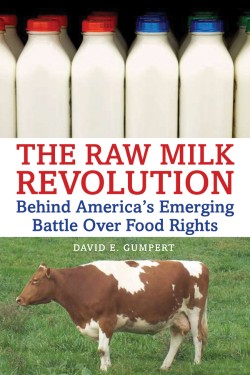I’ve had some great discussions with readers on Organaholic! about raw milk.
Raw milk is unpasteurized, unhomogenized milk, the way we drank it for millennia until we discovered that by heating milk we could kill off dangerous pathogens that were making people sick.
Before readers brought raw milk to my attention, I never thought much about it.
But it’s getting harder and harder to stay ignorant. The more I read about the organic food movement and the countless issues people raise these days about the way we grow our food, the more I hear about raw milk.
Part of this is because political activity is again gearing up, with some states looking to tighten laws on the sale of raw milk and others considering relaxing them. At the federal level, the FDA is considering extending the amount of time raw milk cheese has to age before it’s allowed to be sold in stores. (The requirement is currently 60 days.)
I haven’t drunk milk since an Atkins-inspired dieting fad lost me 20 pounds. Part of that diet was to avoid milk because of its sugar. Today I consume natural sugars again (blueberries and strawberries are loaded with them, but I eat them without thinking twice) though I’ve continued to keep added sugars and any other refined carbohydrates off my plate as much as it’s possible to in today’s world.
But I still don’t drink milk. Partly this is because I’ve lost the taste for milk, and the thought of drinking a creamy substance that comes from a cow’s udder somehow revolts me (though I eat plenty of cheese and some yogurt). But the other part is my general reluctance these days to eat animal products, not because they’re inherently unhealthy (I think few foods could be better for you) but because of the way they’re produced today.
I won’t get into all of these issues because I’ve discussed them ad nauseam in prior posts. (See this one on beef and this one on eggs.) But I will talk about milk, which is emblematic of the problem.
The milk we drink today is different from the milk mankind has consumed since we first started rearing goats, sheep and cattle some 5,000 years ago.
(1) Today we feed cows primarily grain. For millennia they ate primarily grass. The shift has changed the composition of the beef we eat by, among other things, raising the saturated fat content and lowering the omega-3 fatty acid count.
(2) Today’s milk is pasteurized. This means that it’s heated for a brief period to kill of bacteria. But that heating also kills off digestive enzymes, beneficial bacteria, vitamins and minerals.
(3) Today’s milk is homogenized. This involves mixing up the milk in a way such that the fat is broken down into small pieces that don’t separate as easily as milkfat traditionally does. So milk from every carton looks the same. But homogenization increases the amount of oxidized cholesterol in your milk. And oxidized cholesterol is the type that sticks to your arteries, leading to heart disease.
These are three pretty big differences that scare the heck out of me. And raw milk (at least, when it’s grass-fed) eliminates all three.
Does this mean we should all drink raw milk? I’m not sure, but I lean toward “yes.” The reason we don’t drink it today is apparently fear of bacterial infection. But if we use proper procedures and proper care there’s no reason we can’t produce raw milk that’s just as safe as pasteurized milk.
The thing is, these days we probably don’t use proper procedures and proper care. We treat cattle poorly, leave them prone to infections, mix together milk from thousands of cows, you get the point. But it doesn’t have to be that way.
In several states, raw milk is available in stores, but only at a price: it can cost four times more than its pasteurized equivalent. But if more people demanded it, more farmers would produce it, and costs would come down. Maybe not to the point where they are today, but maybe to a point where it would make it worth buying the milk, in order to take advantage of those enzymes, “good” bacteria, vitamins and minerals our species is used to getting but that we no longer get today.
The good news is, more people are finding out about it. And so if it really is significantly better for us, we’re more likely to find out, and more likely to have it available to us, at least as an option.
In the meantime, I right or wrong, I shy away from what’s sold in stores today.
Do you think modern milk, even if a shadow of traditional milk, is still a good addition to your diet?


We are raw milkies.
Pingback: Amish Busted Like Drug Dealers For Selling Raw Milk | Mark Spearman
you make use of a wonderful weblog here! would you like to make some invite content on my website%3
Safe ffor Daily Use – You can be sure that these products have
been tested to be safe for day to day use. In just about 30
minutes or less, hair can be permanently straightened annd smoothed
with minimal irritation to the scalp or skin with a no-lyehairrelaxer.
You’ll have times of extreme frustration with her when she misses another hysterical comment
you make, oor she doesn’t take part in ‘real’ conversations.
If you should go out in the sunn or want to wear short sleeves and pants you
should usually use sun block while in the sun’s rays.